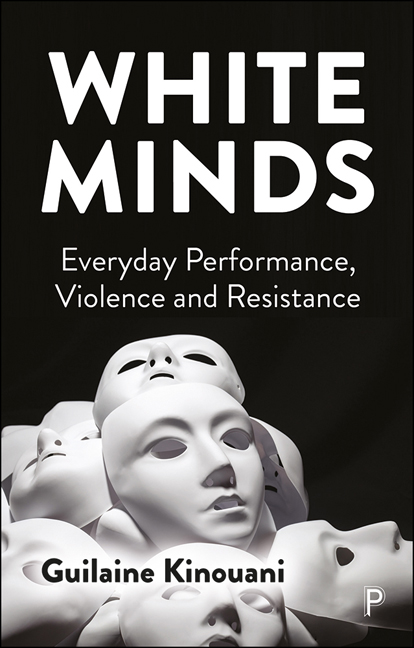Book contents
- Frontmatter
- Dedication
- Contents
- Acknowledgements
- Preface
- Note on language
- Introduction
- 1 Whiteness, time and space
- 2 White gazes
- 3 White envy
- 4 White sadism
- 5 White trauma
- 6 White dissociation
- 7 White shame
- 8 White ambivalence
- 9 White complicity
- Whiteness and resistance: by way of conclusion
- References
- Index
9 - White complicity
Published online by Cambridge University Press: 28 March 2024
- Frontmatter
- Dedication
- Contents
- Acknowledgements
- Preface
- Note on language
- Introduction
- 1 Whiteness, time and space
- 2 White gazes
- 3 White envy
- 4 White sadism
- 5 White trauma
- 6 White dissociation
- 7 White shame
- 8 White ambivalence
- 9 White complicity
- Whiteness and resistance: by way of conclusion
- References
- Index
Summary
Over the past few years, I have been gravely disappointed with the white moderate. I have almost reached the regrettable conclusion that the Negro’s great stumbling block in his stride toward freedom is not the White Citizen’s Counciler or the Ku Klux Klanner, but the white moderate, who is more devoted to ‘order’ than to justice; who prefers a negative peace which is the absence of tension to a positive peace which is the presence of justice; who constantly says: ‘I agree with you in the goal you seek, but I cannot agree with your methods of direct action’; who paternalistically believes he can set the timetable for another man’s freedom; who lives by a mythical concept of time and who constantly advises the Negro to wait for a ‘more convenient’ season.
(Martin Luther King, 1963)This extract is from ‘Letter from Birmingham Jail’, an open letter written by Dr King on 16 April 1963 as a response to criticisms by clergymen calling for unity and condemning King’s involvement in direct action. The call for unity was based on the notion that racial injustices were best fought through legal means, in court rather than in the streets. That is to say, through civility and respectable means. King’s response, which became central to the civil rights struggle, defended his position on both religious and moral grounds. He stood by his actions and saw direct action as a legitimate means of achieving justice when diplomacy and dialogue fail, and when justice is not available through other means. The debate around which methods of protest for racial injustice may best suit white society and which timing will accord with its timetable is evergreen. The disapproval of black liberation methods is too often simply the disapproval of black liberation. This message from King at the height of the civil rights movement acts as a powerful reminder that white comfort has always been a significant blocker to justice and equality.
Today, this same preoccupation with (dis)order and ‘negative peace’ can be seen in the way Black Lives Matter protests and anti-racism actions such as ‘taking the knee’ continue to be ridiculed, maligned and fiercely opposed in the press and within most political parties. Hostility and opposition towards Black Lives Matter protests triggered by the murder of George Floyd have been widespread and explicitly expressed by those in high office.
- Type
- Chapter
- Information
- White MindsEveryday Performance, Violence and Resistance, pp. 149 - 161Publisher: Bristol University PressPrint publication year: 2023



